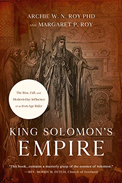by Archie W. N. Roy, PhD and Margaret P. Roy
Ambassador International
book review by Nicole Yurcaba
“Solomon’s ambitions destroyed the domestic cohesiveness between the twelve tribes which David’s statesmanship and openness to God had achieved.”
In this well-researched, informative book, readers gain a deeper understanding behind not only an empire that shaped a significant part of the Middle Eastern region but also King Solomon, the man responsible for an empire’s rise and dissolution. The book details Solomon’s family origins. It also gives information on significant historical events like the end of King David’s powerful reign, Solomon’s consolidation of power, and even Solomon’s focus on the arts and sciences. As the book concludes, readers gain advice about balancing worship and faith in the current era’s demands for worldliness, understanding how real life merges with the end times, and how to live a life in balance with the needs of others.
This book is not only a history text. It is also a guide for achievable Christian living. Throughout its pages, readers find thought-provoking statements like “There are times and seasons in all of our lives and also in our Christian walk with God.” These insights eventually blend the personal with the universal, an engaging strategy that helps readers understand that their individual walk in faith is part of a larger one. This wisdom is found in the chapter “A Time For Every Purpose Under Heaven,” which encourages readers to understand that while life operates on a system of opposites, it is “not about whether the activity is right or wrong but about the time or season when the activity is carried out.” This encouragement helps readers understand the historical importance of Solomon’s work, and it also helps them understand the shifts and seasons occurring in their own lives.
At other times, the book helps readers understand the cultural nuances of Solomon’s time. One of the best examples of this happens in the chapter titled “The Song of Solomon.” The chapter highlights common and popular metaphors applied to the story. It provides a careful examination of the language used in this well-known biblical book and clarifies the meaning behind some of the book’s confusing phrases and comparisons. Notably, it provides an overview of how a wedding in Solomon’s time would be conducted, which helps readers understand cultural and religious expectations and rituals. This particular chapter also helps readers understand Solomon’s legacy and influence throughout the New Testament.
Scripture and biblical studies can be daunting for many. This book is the perfect supplement for those looking to strengthen their historical and academic understanding of the Bible. It relies on scripture as a resource and reference point and then supports its claims with a variety of academic resources to which readers can refer for future use. This book is a worthwhile read for those interested in history because it uses common associations and understandings of Solomon as a foundation but provides various viewpoints to explain and deepen the conversations surrounding one of the Bible’s foremost figures. This book would also be a great resource for Bible study groups, Sunday school teachers, and students taking a religion course. Moreover, this book is an exciting, educational read that is easy to follow and understand.
RECOMMENDED by the US Review

